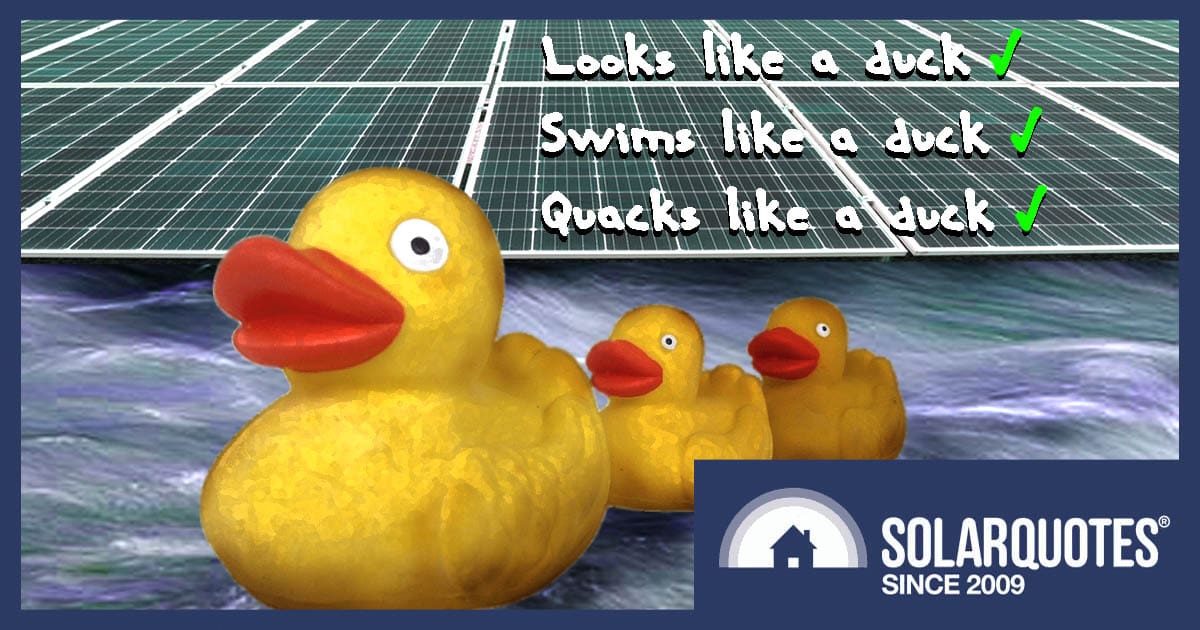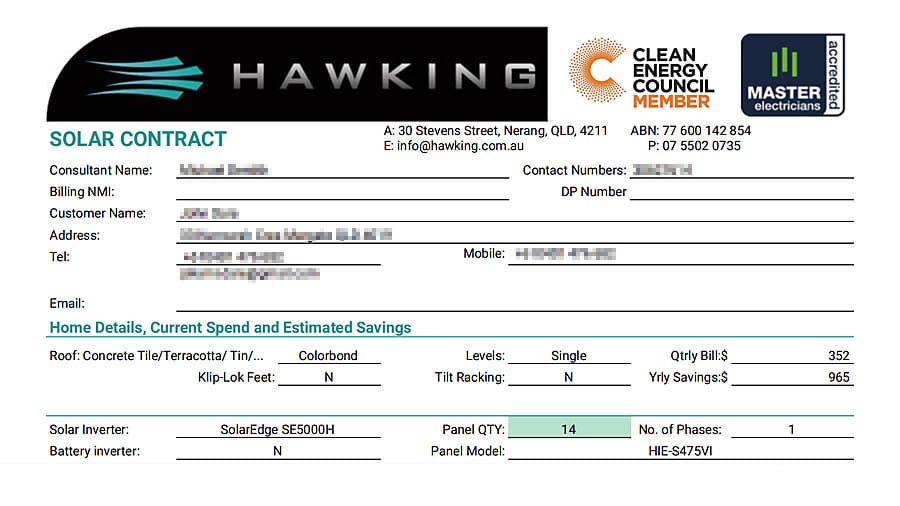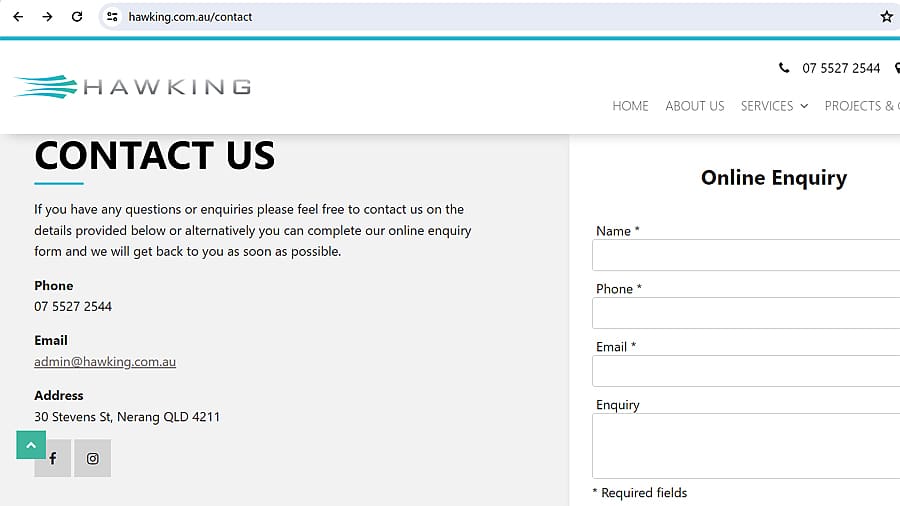
At SolarQuotes, we sometimes hear stories about orphaned customers in a predicament when their installer goes bust. But this one rubs salt into the wound.
I cannot cast judgment on whether this particular instance is legal or not. I’m not a lawyer. But using the simple “duck test”, I can comment on whether I consider it fair and lay out the facts, some of which are available to the public through ASIC and the Australian Business Register (ABR).
Orphan Scott’s Predicament
This story is based on Scott’s experience and his perception of the facts as reported to SolarQuotes, which have not been independently verified. We are using an alias to respect “Scott’s” preference for anonymity.
In early 2021, Scott purchased a rooftop solar system from Hawking Electrical Energy Solutions located on the Gold Coast, Queensland. The system comprised 6.65kW of 475W Hyundai solar panels with SolarEdge P401 optimisers and SolarEdge SE5000H inverter.
The Installer Winds Up Business
In April 2022, at a general meeting of the members of Hawking Electrical Energy Solutions, it was resolved that the company be wound up and that a liquidator be appointed, leaving Scott and other customers without installer-backed warranty and with limited system monitoring. They did not contact Scott; he only found out later when he had an issue with optimiser noise. He called a company with a similar name – Hawking Electrical, which shared the same branding and website URL.
They didn’t want to know about his problem.
Scott then approached SolarEdge directly, and a firmware update soon provided a fix. They also gave him a link to companies that supposedly maintained their equipment. All except one declined unless they had done the installation. He filled out the SolarEdge “administration rights transfer form” with the company, believing they would cover him for monitoring and warranty issues.
Customer Direct To Manufacturer Hurdles
In early December, Scott’s solar output dropped to zero. He tried contacting the company by phone and email, but his efforts were unanswered. Tired of waiting, four days later, he contacted SolarEdge, asking them to check the status and seeking advice.
SolarEdge responded, indicating the inverter had failed, and requested an address and phone number to send a replacement. Scott provided his details and phone number, but no replacement arrived. He tried to call them, but the telephone prompts said they only speak to installers. So he pretended to be an installer and managed to talk to SolarEdge.
That strategy soon failed, and Scott returned to square one, given the same information as in his first dialogue. After going in circles for some time, he finally found an installer who would take on the role. Thankfully, I’m pleased to report that Scott is happy with the service he received, and the SolarEdge inverter has been replaced, with monitoring back to normal.
A Familiar Story, A Familiar Name
So far, there is nothing unusual about Scott’s predicament. Although inconvenient, it’s a familiar story when solar installers go out of business and leave customers in warranty no-man’s land. It’s a big fat pain in the ass that costs time and money.
What is unusual though, is in this instance, although administrators had wound up Hawking Electrical Energy Solutions, a company called Hawking Electrical with the same branding, website URL, and address was, and still is, trading.

Scott’s solar contract with Hawking dated 2021. Note the branding, website URL, and address.

Hawking’s website contact page (active at the time of writing 25-1-24.) Again, note the branding, website URL, and address.
The Duck Test
We all know the saying, “If it looks like a duck, swims like a duck, and quacks like a duck, then it probably is a duck.”
I decided to find out if Hawking Electrical was a duck.
On the surface, Hawking Electrical and Hawking Electrical Energy Solutions look like birds of the same feather. In addition, Hawking Electrical Energy Solutions has also been using other trading names at various times, such as Hawking Solar and Hawking Electrical and Solar. Some companies and trading names share the same ABN; others do not1.
The director of the now-liquidated Hawking Electrical Energy Solutions Pty Ltd, was also a previous director of the current trading company Hawking Electric Pty Ltd. This information is available to the public through ASIC by purchasing a company extract containing current and historical company information.
The Hawking group of companies has been operating in some form since the 1990s, and tried solar, but for some reason decided to wind up that side of their operations. That part of the corporate family has gone into liquidation, leaving a convoluted paper trail and several noses out of joint. Scott believes he received a raw deal, joining many others who share the same sentiment.
The Other Side Of The Story
I wanted to get the Hawking side of the story, so I called Hawking Electrical to see if I could speak to the head duck. I got through but encountered resistance similar to Scott’s. There was no acknowledgment of any connection between the two companies despite the “coincidence” that they shared the same branding and website URL. I was, however, immediately offered the phone number of the liquidator, Vincents, which was at the receptionist’s fingertips.
I phoned Vincents, who assured me that Hawking Electrical Pty Ltd and Hawking Electrical Energy Solutions Pty Ltd were two different companies and legally not responsible for one another. They suggested that orphaned customers from Hawking Electrical Energy Solutions should phone them on 07 3228 4000 if they have any warranty issues.
Company Legal Loopholes
It’s nothing new when a business uses a legal structure to protect itself by operating different parts of its enterprise as separate entities on paper; meanwhile, on the ground, it’s business as usual. The Hawking group appear to have ticked all the boxes about outstanding creditors for their solar division, and conveniently sidestepped any ongoing commitment to orphaned solar customers of Hawking Electrical Energy Solutions.
As well as contacting SolarQuotes, Scott has written to the Queensland Office of Fair Trading and his state and federal members of parliament to articulate his complaint. As yet, these have yet to deliver any meaningful response.
What To Do If You’re In The Same Boat
The ACCC has published an article titled ‘When a business goes bust‘ that contains the following statement for what consumers should do if you have a problem with a product purchased from an insolvent business:
“The things you can do if you have a problem with a product purchased from a business that went bust will depend on the circumstances.
If the business continues to trade under administration, the business should provide a solution in line with the consumer guarantees. You can contact the administrator for help in contacting the business.
If the business is sold to a new business in the administration process, as part of the sale, the new business may or may not agree to deal with issues from products bought before it purchased the business that went bust. Check the administrator’s announcements, or the announcements of the new business that has purchased the business that went bust, to find out.
If the manufacturer of the product is a different business from the one that went bust, you can contact them to try to seek a solution from them.”
If the demise of your installer means that you need warranty service from the manufacturer of the solar panels, solar battery or inverter, then their Australian office (or importer) has obligations under Australian Consumer Law. If they need reminding of these obligations, a letter from you reminding them often does wonders. This ACCC letter template makes it easy.
If It Looks Like A Duck, Swims Like A Duck…
My beef has nothing to do with quality of work or even that the company has decided to wind up its solar division. Companies come and go all the time for various reasons. If the Hawking group of companies decided that solar isn’t for them, they have a right to call it a day. But should that absolve them of any obligations to fulfil warranties and provide ongoing support to previous customers while other arms of the business are still trading?
The Hawking group may have all their company’s procedural ducks in a row. Still, their actions, including denying any association with their previous entities raise serious concerns. This behaviour certainly appears, at-best, misleading to me.
“If it looks like a duck, swims like a duck, and quacks like a duck, then it probably is a duck.”
My advice is to steer clear of the pond.
Footnotes
- All company names mentioned in this article are searchable on the ABN Lookup website. Note that starting 1st November 2025, ABN Lookup will not display trading names and will only display registered business names. ↩

 RSS - Posts
RSS - Posts



It is an annoying/challenging but required part of corporation law. If a country doesn’t give companies the ability to separate a part of the business off to give protection to the rest of the business, then the countries economy flounders as company owners get very cautious with expanding their business.
However if you make it too easy, then some operators use it to their unfair advantage.
The government has tried to stamp down on that with the Phoenix legislation and the rules about directors of bankrupt companies having limits on their future behaviour, but they are having to be careful that they don’t shoot the goose that has laid the golden egg.
I am a retired business owner and I successfully sold my business so I understand business. ….. Legislation should be set so that warranties MUST be transferred smoothly and seamlessly .
Why can’t owners of the system have administrator rights over their inverter? Most of us are use to managing software updates to numerous devices. Why not our inverter? Who makes up these rules and what is their rationale?
Thank you for the informed blog. I will probably go through that stage soon, because my Solar company is in sudden Voluntary Liquidation, and the contact I have is no longer working for them as of that announcement. I’m waiting to hear from the ACCC about one of my Powerwall 2 batteries degrading at 8%pa for the first 3 years and the last year has stabilised.
UK members of the Tesla FB groups have noticed the same and one user posted that Tesla are managing it. I have noticed this and there is now more withdraw from my other 2 x PW2’s. I’m now waiting until Winter to see if there’s a sudden degrade again.
I was made aware of the problem because Tesla rang me in Aug’22 and now have me now doing an annual check with them.
My concern is those with a single PW2 from the July 2019 manufactured batch, who are probably only getting 3/4’s of the available capacity because of this sudden degradation. I believe this situation it’s “not fit for purpose”. Imaging a new car, using extra oil in the first 2-3 years. Fortunately I have the extra capacity and it isn’t affecting our Solar journey. But I’m will be 85 this year and attempting to document so my son and electrician can handle the eventual replacement
I bought my Enphase system through what was then Hawking Electrical and Solar. The address and phone number were both what is now Hawking Electrical. The solar business was later separated and gained a new phone number and address, although on my system page it is still the original phone number which is Hawking Electrical.
I was very lucky. I had an Envoy fail. It was replaced by Enphase under warranty and installed at no charge by Hawking just a few months before the company went belly-up. I had a lot trouble contacting Hawking and was quoted about $500 by another company to installed the new Envoy while I waited for a response.
Hawking Electrical was very adamant when I called them, that they were not the “solar” company, but it sure looked like a duck to me. It did ring alarm bells.